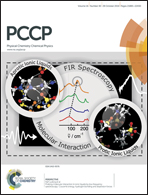Visible-ultraviolet vibronic emission of silica nanoparticles
Abstract
We report the study of the visible-ultraviolet emission properties and the structural features of silica nanoparticles prepared through a laboratory sol–gel technique. Atomic force microscopy, Raman and Infrared investigations highlighted the 10 nm size, purity and porosity of the obtained nanoparticles. By using time resolved photoluminescence techniques in air and in a vacuum we were able to single out two contributions in the visible emission: the first, stable in both atmospheres, is a typical fast blue band centered around 2.8 eV; the second, only observed in a vacuum around the 3.0–3.5 eV range, is a vibrational progression with two phonon modes at 1370 cm−1 and 360 cm−1. By fully characterizing the spectroscopic features of this structured emission, we determine its vibronic properties and clarify the different origins with respect to the blue luminescent defect.


 Please wait while we load your content...
Please wait while we load your content...